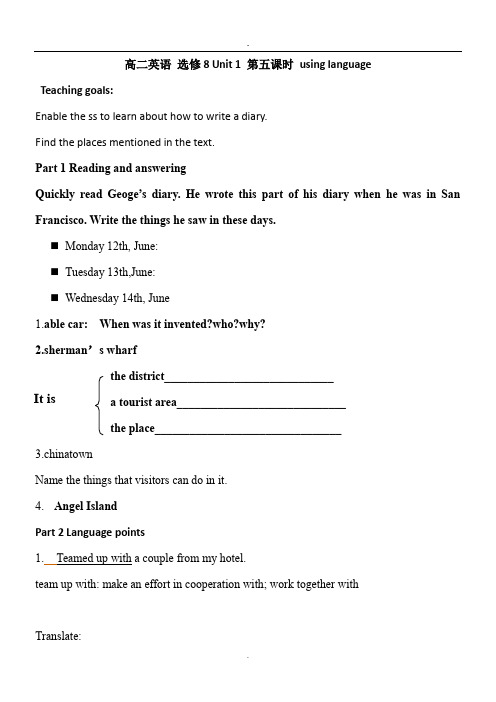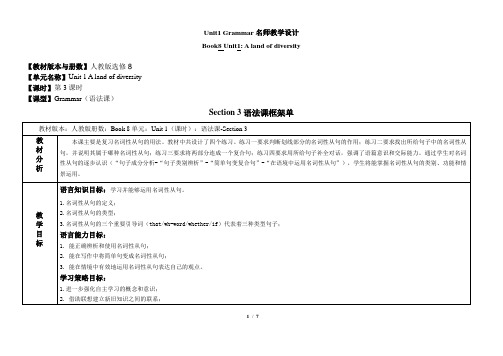选修8Unit1(5)教师用
人教版高中英语选修八Unit 1第5课时(语法)教案

高二英语选修8 Unit 1 第五课时using languageTeaching goals:Enable the ss to learn about how to write a diary.Find the places mentioned in the text.Part 1 Reading and answeringQuickly read Geoge’s diary. He wrote this part of his diary when he was in San Francisco. Write the things he saw in these days.⏹Monday 12th, June:⏹Tuesday 13th,June:⏹Wednesday 14th, June1.able car:When was it invented?who?why?2.sherman’s wharfthe district_____________________________ ArrayIt isa tourist area_____________________________the place________________________________3.chinatownName the things that visitors can do in it.4.Angel IslandPart 2 Language points1.Teamed up with a couple from my hotel.team up with: make an effort in cooperation with; work together withTranslate:He teamed up with an experienced worker in the project.2.It’s a 79km round-trip that takes in all famous tourists spots.take in:___________;__________ __;__________________;_________ ______________;Eg. 1)He had nowhere to live in, so we took him in.2)The dress needs to be taken in.3)They listened to my lecture, but how much did they take in , I wonder?4)Don’t let yourself be taken in by these politicians.思维拓展:连线take off 拆开,拆散take on 贬低, 贬损名誉等take apart 从事,对…..产生兴趣,打听,占用空间或时间take away from 脱下,脱去,起居,休假,离开take up 开始雇佣,露出,承担,接受3.a great many: a large number (of);There are a great many reasons why you shoudn’t do it.remember: it is only used to modify countable nouns.4.formal informal5. feel like doing sth:to have a wish for; want。
人教课标版高中英语选修8 Unit1_Grammar名师教学设计

2.T: From the analysis of the sentence patterns, can you tell me what types of noun clauses are there.
S:Noun clauses are classified as subject clause, object clause, predicative clause and appositive clause.
It happened that…碰巧…
It appears that…似乎…
4It is+过去分词+从句
It is reported that…据报道…
It has been proved that…已证实…
It is said that…据说…
it作形式主语和it引导强调句的比较
it作形式主语代替主语从句,主要是为了平衡句子结构,主语从句的连接词有变化。而it引导的强调句则是对句子某一部分进行强调,无论强调的是什么成分,都可用连词that。被强调部分指人是也可用who/whom。例如:
DELC2获取新知识
Step2
Production
(学习
新知)(20mins)
1.Teacher guide Ss to learn the grammar rules of noun clauses.
名词性从句
【概念与分类】在句子中起名词作用的句子叫名词性从句。名词性从句的功能相当于名词词组,它在复合句中能担任主语、宾语、表语、同位语、介词宾语等,因此根据它在句中不同的语法功能,名词从句又可分为主语从句、宾语从句、表语从句和同位语从句。
It hasn’t been decided whether (if) we shall attend the meeting.
高中英语(人教选修八)教师用书配套课件Unit1AlandofdiversityUnitReview

教师用书配套课件Unit 1 A land of diversityUnit ReviewI. 单词串记(根据构词法完成下面空格)1. 匕 +-ment->n.punish (讥・)惩罚一> ________ (门•)惩罚[类记]move (匕)移动,搬家-> _________ (门・)运动,移动equip 山)配备,装备-> 」 ... 小・)装备,设备govern (/ )统治,管理二^竺竺[(门.)政府argue (认)争论,论证->________ (门・)争论,论据develop (/ )发展一> _________ (门・)发展moveme ntequipme nt governme nt argume ntdevelopme nt妙班周总绪・緩提井 温譽提示 &呆您程財本理件时it 務中出现圧字现家•请关 用所冷幻灯片.主軒打开耳血审观右・frien dship leadershiprelatio nshipscholarshipn.连词成句(用本单元的词汇完成句子)1 •在加利福尼亚有许多移民,大多数人现在仍沿袭着自己的 风俗和文化。
2. n. /adj. +・ship —门.hard (adj. )ffl 难的一> _ 【类记】 —member (门•)成员一>friend (门•)朋友-> ___ leader (门•)领导―> _ relation (门・)关系亲戚-> scholar (门.j 学者一> ____ (门・)苦难;困苦hardshi0 )成员资格—(门・)友谊—(门・)领导地位___________ (门.)关系,关联There are a large number of immigrants(移民)in California, the ____________ of whom today still __________ their own customs and cultures.majority keep up2.尽管非常困难,他还是在那里设法生存下去并最终过上稳定的生活。
新课标人教高中英语选修八教师配套用书课件:Unit+5+Using+Language

•
Байду номын сангаас
高中英语(人教版选修8)教师用书:Unit 1 Section_Ⅲ Learning_about_Language_-_Using_Language(含答案)

Section_ⅢLearning_about_Language_&_Using_LanguageFill in the blanks according to the text.GEORGE’S DIARY 12TH_14TH JUNEDate Transportation Experience Feeling12th, June•1.Bus•Cable car•Visited2.San_Francisco_Bay andthe city on the cable car.•Had lunch at 3.Fisherman’s_Wharf.•4.Exhausted13th, June •Car •Had a(n)5.79km_roundtrip thattakes in all the famoustourist spots.•Went to 6.Chinatown,_andsaw temples, markets, artgalleries and a(n)7.museum about the historyof Chinese immigration.•Wanting tovisit again14th, June •8.Ferry •Went to 9.Angel_Island,_afamous immigration stationfrom 1882 to 1940.•Watched the Golden GateBridge on the way.•10.Thoughtfuland thankful(一)根据所给词性和汉语意思写出单词,并适当拓展1.indicate vt.指出;指示;指明;表明;暗示→indication n.指示;标示2.luggage n.行李→baggage (同义词<美>)n.行李3.apply v.申请;使用→applicant n.申请人4.justice n.正义;公平→just adj.正义的;公正的;合理的5.hire vi.& n.租用;雇用→hirer n.租借者;雇主→employ (同义词)v.雇用;使用6.fascinating adj.迷人的;吸引人的→fascinate v.使着迷;使感兴趣→fascination n.魅力;入迷;着迷7.reform n.&v. 改革;改造;改良→reformer n.改进者;改革者→reformation n.改进;改良8.insert vt.插入;嵌入→insertion n.插入;插入物(二)根据语境写出所给单词的正确形式9.Such a thing hardly occurs,_that is to say, it is not a common occurrence.(occur)10.He was punished for speeding and he said the punishment gave him a good lesson.(punishment)11.It was apparent to all that he was guilty and apparently he would take on all the responsibility.(apparent)12.The conductor will conduct the orchestra. (conduct)1.occur[教材原句] Yes.It didn’t occur to me that ...是的。
高中英语选修8Units1-5知识点复习课件(人教新课标)

Grammar Focus
Complex sentences
This unit explores complex sentences, including how to identify the subject, predicate, and object, as well as how to combine simple sentences using various conjunctions.
Reading comprehension skills
This unit provides students with opportunities to improve their reading comprehension through a variety of texts, including expository, narrative, and argumentative writing.
THANKS
感谢观看
掌握重点词汇和表 达
掌握Unit 4中出现 的新词汇,包括名 词、动词、形容词 等。
通过例句和练习, 加深对词汇和表达 方式的理解和记忆 。
Grammar Focus
掌握核心语法知识
•·
01
掌握Unit 4中的重点语法知 识,如时态、语态、虚拟语
02
03
气等。
通过例句和练习,深入理解 语法的运用,提高语言运用
05
CATALOGUE
Summary of knowledge points in Unit 5
Vocabulary and expression
Vocabulary
This unit introduces approximately 30 new words and phrases that are essential for understanding and communication. Some examples include "perpetual", "benevolent", and "impeccable".
2020届高考艺考生英语复习教师用书:选修八Unit 5 Meeting your ancesto

姓名,年级:时间:Unit 5Meeting your ancestors阅读单词1。
archaeology n.考古学2.excavate vt. 挖掘;发掘3.acute adj。
有观察力的4.mat n. 席子;垫子5.scrape vt. 擦净;削平6。
bead n.小珠子;滴7.seashell n. 海贝壳8.category n. 种类;类别9.skateboard n。
滑板10.pulse vi。
&n. 搏动;脉搏写作单词1。
tentative adj。
试探性的;不确定的2.centimetre n。
厘米3.alternative n. 可能的选择adj。
供选择的;其他的4.somehow adv. 以……方式;不知怎么地5.regardless adv。
不管;不顾6.album n。
相册;集邮册;唱片7.ample adj. 足够的;充足的;富裕的;丰富的8.scrape n. (刮、抓、划的)痕迹;搔;挠vt. 搔;抓;擦伤;刮坏9.dizzy adj。
头晕目眩的;眩晕的;使人发晕或困惑的10.primitive adj。
原始的;远古的;简陋的11.howl v. 嗥叫;叫喊;吼叫n. 长嚎;嗥叫12.spit vt。
吐出(唾液、食物等)vi. 吐痰13.delete vt. 删;删除14.seashell n。
海贝壳15.pulse vi。
强烈而有规律地跳动;搏动n。
脉搏;节拍16.category n. 种类;类别;范畴17.arrest vt。
逮捕;吸引n。
逮捕;拘留18.kindergarden n. 幼儿园19.ripen vt。
使成熟20.skillful adj。
有技巧的[语境活用]1.He continued speaking,regardless (不顾)of my feelings on the matter.2.The police have arrested (逮捕) almost everybody who is involved in the murder.3.It's not manners to spit (吐痰) in the street.4.Please delete (删除) the documents that you don’t want to keep in the computer。
高中英语选修8 Unit 1

(4)_ra_c_i_a_l adj. 人种的; 种族的→_r_a_ce_ n. 种族; 比赛 (5)_a_p_p_ly_ vt. 申请→_a_p_p_l_ic_a_t_i_o_n n. 申请→_a_p_p_l_ic_a_n_t_ n. 申请人 (6)_in_d_i_c_a_t_e vt. 指出; 标示; 表明; 暗示→_in_d_i_c_a_t_io_n_ n. 迹象→_in__d_ic_a_t_o_r n. 指示器; 指示物 (7)_a_p_p_a_r_e_n_t adj. 显而易见的; 显然的; 表面上的→ _a_p_p_a_r_e_n_t_ly_ adv. 显然地; 显而易见地
3. How many candidates are standing for _e_le_c_t_io_n_ (elect)? 4. He was sent to his room as a _p_u_n_i_s_h_m_e_n_t_ (punish).
Ⅱ. 用以上适当的短语填空 1. It was becoming more and more difficult to _li_v_e_o_n_ his salary. 2. The water may be carried _b__y_m__e_a_n_s_o_f_ a pipe. 3. They will certainly need to _ta_k_e__in_ plenty of liquid.
【知识拓展】
means
表示“方法、手段、工具”, 常与介词by连 用
method
指做某事的具体步骤或程序, 也指系的、抽 象概念的原理, 常与介词of搭配
way
是最常用的词, 本意是“通路”, 引申作 “方式、方法”讲, 含义很广
- 1、下载文档前请自行甄别文档内容的完整性,平台不提供额外的编辑、内容补充、找答案等附加服务。
- 2、"仅部分预览"的文档,不可在线预览部分如存在完整性等问题,可反馈申请退款(可完整预览的文档不适用该条件!)。
- 3、如文档侵犯您的权益,请联系客服反馈,我们会尽快为您处理(人工客服工作时间:9:00-18:30)。
知识梳理名词性从句一、从句的种类:主语从句(Subject Clauses)1、名词性从句表语从句(Predicative Clauses)Noun Clauses 宾语从句(Object Clauses)同位语从句(Appositive Clauses)2、定语从句(Attributive Clauses)3、状语从句(Adverbial Clauses)注:以it作形式主语,把主语从句后置的常用的句型有:(1)It + be + 形容词+ that从句(2)It + be + 名词词组+ that从句(3)It + be + 过去分词+ that从句(4)It seem, happen等不及物动词+ that从句二、常用的关联词1、从属连词that(无词义);whether是否;if假如,是否although(though)虽然;because因为when当…时候;before在…前;after在…后since既然,自从;as正如,尽管,一边,由于;while在…期间as soon as一…就;as long as只要;as if好像2、连接代词who, whom, which, what, whose3、连接副词when, where, why, how4、关系代词who, whom, whose, which, that5、关系副词when, where, why1、主语从句:种类关联词例句说明连that That he will come and help you iscertain. 他来帮助你是确实无疑的。
that在句首不可省去词whether Whether there is life on the moon is aninteresting question. 月球上有没有生命是个有趣的问题。
主语从句中只能用whether不可用if。
主语连接代词whowhatwhichwhateverWhat he wants to tell us is not clear.他要跟我们说什么,还不清楚。
Who will win the match is stillunknown. 谁能赢得这场比赛还不得而知。
主语从句放在句首,句子常显得笨重,因此一般从句连接副词whenwherewhyhowIt is known to us how he became awriter. 我们都知道他是如何成为一名作家的。
Where the English evening will beheld has not yet been announced. 英语把它移到句子后面,前面用引导词“it”来作形式主语。
晚会将在哪里举行,还没有宣布。
2、宾语从句:种类关联词例句说明陈述意义thatI believe(that) he is honest. 我相信他是忠诚的。
We must never think(that) we are good ineverything while others are good in nothing. 我们决不能认为自己什么都好,别人什么都不好。
that在句中不担任任何成分,在口语或非正式的文体中常被省去,但如从句是并列句时,第二个分句前的that不可省。
宾疑问意义ifwhetherI wonder whether he will come or not. 我想知道他来还是不来。
Everything depends on whether we haveenough money. 一切要看我们是否有足够的钱。
I don’t know if(whether) it is interesting. 我不知道它是否有意思。
He doesn’t care if it isn’t a fine day. 他不在乎天气是否好。
whether常与or not连用,不能用if代替。
作介词宾语要用whether不能用if。
从句是否定句时一般用if引导。
语特殊疑问意义who, whom,which,whose,what, when,where, why,how,whoever,whatever,whicheverPlease tell me what you want. 请告诉我你需要什么?She always thinks of how she can workwell. 她总是在想怎样能把工作做好。
She will give whoever needs help a warmsupport. 凡需要帮助的人,她都会给予热情的支持。
宾语从句作及物动词宾语也可做介词的宾语。
从注1 We must make it clear that anyone whobreaks the law will be punished. 我们必须认清无论谁违反了法律都要受到惩罚。
如果宾语从句后面有宾语补足语,则用it作形式宾语,将从句后置。
句注2 We don’t think you are here. 我们认为你不在这。
I don’t believe he will do so. 我相信他不会这样做。
think, believe, imagine, suppose等动词引出的宾语从句,要将从句中的否定形式,移动主句中。
3、表语从句:种类关联词例句说明表连词thatwhetheras ifThe problem is(that) they can’t get he re earlyenough. 问题是他们不能很早到达这里。
It looks as if it’s going to rain. 看起来天要下雨。
在非正式的文体中that可以省去。
语从连接代词whowhatwhichThat’s just what I want. 这正是我想要的。
The question is who(which of you) will be the nextspeaker. 问题是谁(你们哪一位)接着发言。
表语从句位于主句系动词之后句连接副词whenwherewhyhowThis is where our problem lies. 这就是我们的问题所在。
That is why he didn’t come to the meeting. 那就是他为什么不到会的原因。
4、同位语从句:种类关联词例句说明同位语从句由连词that引导,不担任成分,也可有when,how,where等引导。
The news that he had landed on the moon spread allover the world. 他曾在月球上登陆这个消息传遍世界。
I have no idea when he will come back home. 我不知道他什么时候回来。
The thought came to him that Mary had probably fallenill. 他想到可能玛丽生病了。
He must answer the question whether he agrees to it ornot. 他必须回答他是否同意此事这样一个问题。
同位语从句说明其前面的名词的具体内容,常用的名词如:fact, news, idea, hope,thought,question, order, fear,doubt, word, proof,belief,story等。
总述1.主语从句——在句中作主语,可用it作形式主语e.g. What you said sounds reasonable.It is well known/reported/thought/said/…that…It is natural/surprising/necessary/certain/true/clear…that…It is a pity/a shame/an honour/no surprise/no wonder…that…It doesn’t matter whether…It seems\appears that…It happens that…碰巧2. 表语从句-----位于系动词之后,表语从句还可用as if/as though/because/why引导e.g. The question is who can complete the difficult task.3.同位语从句-----跟在名词后面,进一步说明该名词的具体内容。
名词主要有:fact, news (word), promise, idea, truth, thought, suggestion, hope, proposal, doubt等。
一般用that引导,不省略,不用which..也可用whether (不用if), who, what, which, when, where, how , whye.g. The news that our team has won the match is true.4.宾语从句1)作及物动词或介词的宾语(it可作形式宾语;注意whether和if区别)2)直接引语和间接引语I doubt whether\if he will keep his word. I don’t doubt that our team will win.一.引导词1.从属连词有that, whether, if。
它们只起连接作用,不充当从句的任何成分2.连接代词有who, whom, whose, what, which, whatever, whoever, whichever等。
它们在从句中起连接作用,本身又作从句的主语、宾语、宾补或定语。
3.连接副词有when, where, why, how 等,它们既起连接作用,本身又作从句的状语。
how many(much, far, long, often, soon)等引导主语、宾语、表语从句二.语序:名词性从句中一律用陈述句语序When he will arrive is not known.I don't know how I can get through the exam.三.时态1.在宾语从句中,当主句是一般现在时,其从句的谓语根据各种需要用各种时态Mary is very diligent. Mary was very diligent.Mary is reading English. Tom said Mary was reading English.Tom says Mary will give us a talk. Mary would give us a talk.Mary has been caught in the rain. Mary had been caught in the rain.但是,宾语从句表示事实、格言、谚语等,从句的时态仍用一般现在时。
